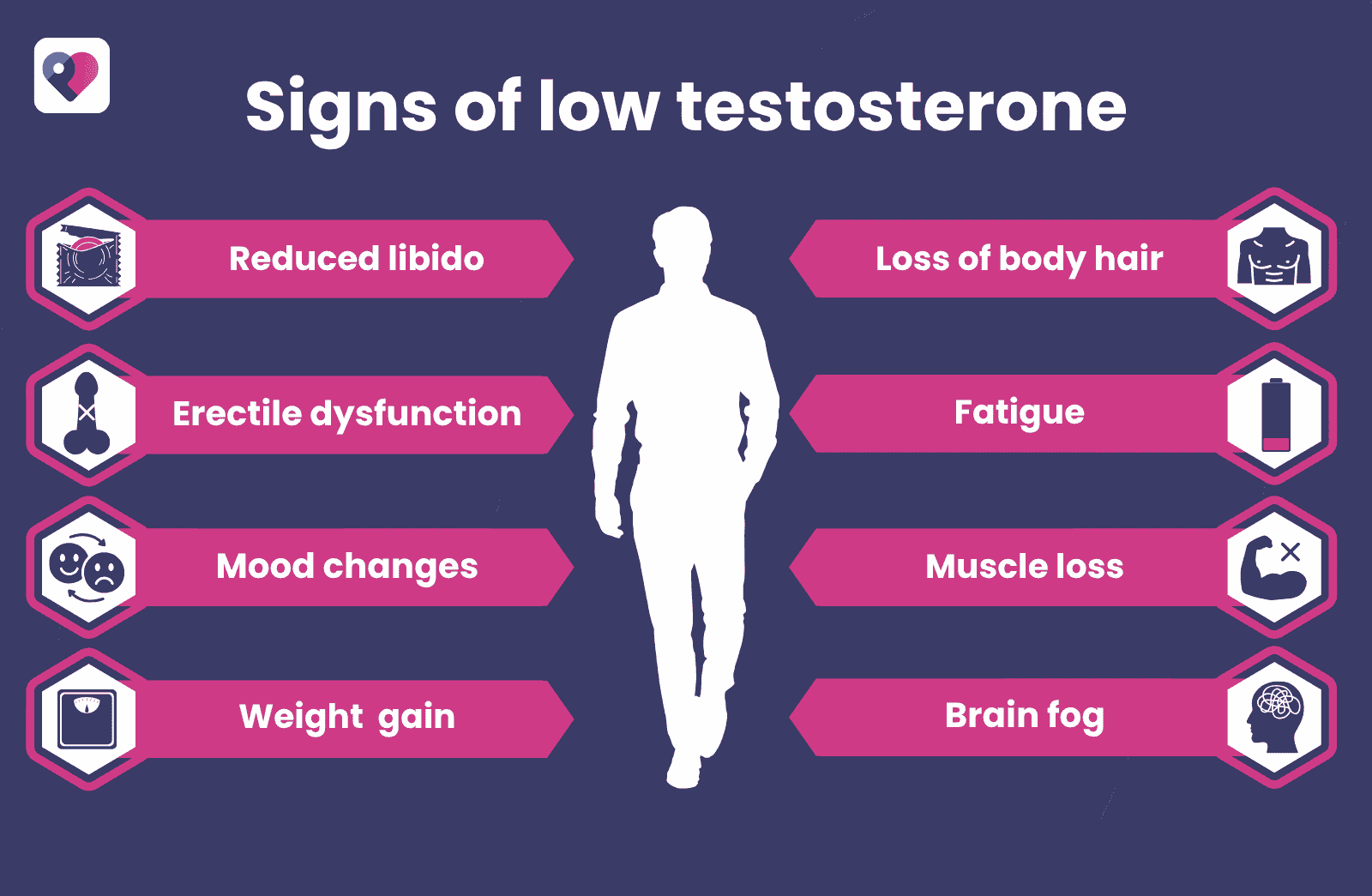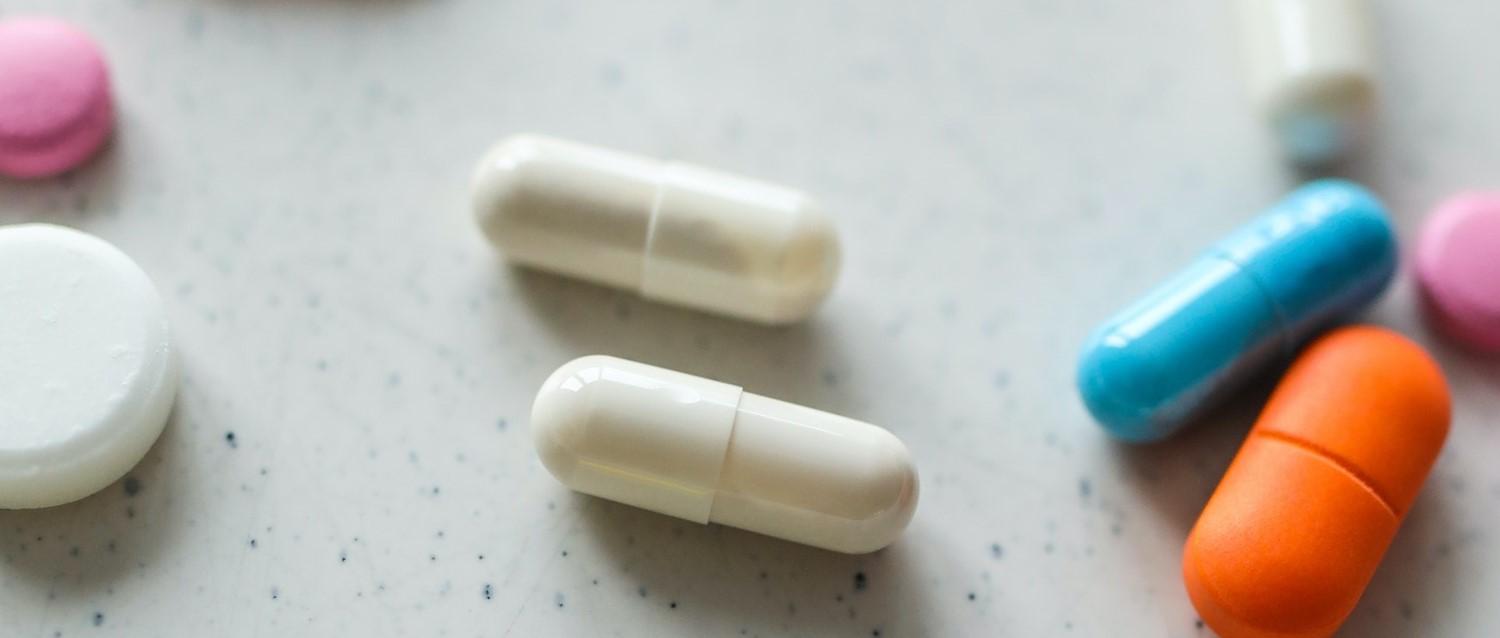
9 signs of low testosterone in men
Peer reviewed by Dr Colin Tidy, MRCGPAuthored by Heather AinsworthOriginally published 24 Nov 2025
Erfüllt die Anforderungen des Patienten redaktionelle Richtlinien
- HerunterladenHerunterladen
- Teilen Sie
- Sprache
- Diskussion
If you’ve been feeling unusually tired, moody, or losing interest in things you used to enjoy, low testosterone could be the reason - and it's more common than you think.
In diesem Artikel:
Lesen Sie unten weiter
Why is testosterone important?
Testosterone is a key hormone that plays a major role in men’s health. It helps support muscle growth, strength, sex drive, mood, and overall energy levels1. Think of it as one of the body’s main 'performance regulators.'
As men age, testosterone levels naturally decline - but stress, lifestyle, and certain health conditions can cause levels to drop faster than expected.
Recognising the signs of low testosterone early is important as a lack of it can affect both your physical and mental health.
Signs of low testosterone in men

Grafik: Heather Ainsworth
What are the signs of low testosterone?
1. Reduced libido
Low testosterone can directly affect your sex drive (libido)2. Men with reduced hormone levels often notice a decreased interest in sexual activity or intimacy, which can impact relationships and overall quality of life.
2. Loss of body hair
Testosterone helps regulate hair growth3. A drop in levels can lead to thinning or loss of hair on the face, chest, or body over time.
3. Fatigue
Feeling unusually tired (fatigue), even after enough sleep, is a common symptom of low testosterone4. It can reduce energy levels and make everyday tasks feel more exhausting than usual.
4. Depressed mood
Hormonal changes can influence brain chemistry. Men with low testosterone may experience irritability, sadness, or even depression5, sometimes without realising the hormonal link.
5. Loss of muscle mass and strength
Testosterone plays a key role in building and maintaining muscle1. Lower levels can make it harder to gain or retain muscle, and strength may decline over time.
6. Increase in body fat
A drop in testosterone can contribute to an increase in body fat, especially around the stomach6. This can also increase the chance of metabolic issues such as insulin resistance.
7. Difficulty concentrating or brain fog
Low testosterone may affect cognitive function, making it harder to focus, remember details, or stay mentally sharp during the day7.
8. Increase in breast tissue
Low testosterone levels can lead to the development of excess breast tissue (gynecomastia) in men8. This is often a gradual change but can be noticeable and sometimes uncomfortable.
9. Erectile dysfunction
Testosterone helps regulate sexual function, including erections. Low levels may make it harder to achieve or maintain an erection9, though other health factors can also contribute.
Lesen Sie unten weiter
Wie testet man auf niedriges Testosteron?
If you think you may have low testosterone, the first step is to speak with a doctor or healthcare professional.
Testing isn’t something you can accurately do at home - your doctor will order a simple blood test that measures your testosterone levels, usually taken in the morning when levels are highest.
Depending on the results, they may repeat the test or check other hormones to get a clearer picture of what’s going on.
From there, your doctor can discuss your options, which may include lifestyle changes, further testing, or potential treatment.
How much testosterone should you have?
Testosterone levels can vary from person to person but for adult men, total testosterone levels typically fall between 300 and 1,000 ng/dL (nanograms per decilitre)2.
However, what matters most is not just the number, but how you feel. Some men may experience symptoms even if their levels are technically within the normal range.
That’s why it’s important to look at both your test results and your day-to-day symptoms if something feels off.
Lesen Sie unten weiter
Zusammenfassung
Low testosterone is a common hormonal imbalance that can impact energy, mood, muscle strength, and overall wellbeing - especially in men over 30.
Symptoms to watch for include fatigue, reduced libido, loss of muscle mass, increased body fat (particularly around the stomach), mood changes such as irritability or depression, loss of body hair, low motivation, and trouble concentrating.
If these signs sound familiar, it may be time to speak with your doctor about testing and treatment options.
Weitere Lektüre
1. Rojas-Zambrano et al: Benefits of Testosterone Hormone in the Human Body
2. Sizar et al: Male Hypogonadism
3. Inui S, Itami S: Androgen actions on the human hair follicle
5. Shores et al: Low testosterone levels predict incident depressive illness in older men
6. Kelly et al: Testosterone and obesity
8. Robeva et al: Causes and Metabolic Consequences of Gynecomastia in Adult Patients
9. Martínez-Jabaloyas et al: Testosterone levels in men with erectile dysfunction
Patientenauswahl für Allgemeine Männergesundheit

Gesundheit von Männern
Sind Testosteronpräparate für Männer sicher?
Testosteronpräparate können sich äußerst positiv auf das Leben von Männern auswirken, die einen medizinischen Bedarf haben. Ob als Behandlung für die geschlechtsangleichende Hormontherapie von Frau zu Mann oder bei Testosteronmangel - es gibt zahlreiche Vorteile für die psychische und physische Gesundheit. Wie bei jedem Medikament ist es wichtig, sich über die möglichen Nebenwirkungen der Behandlung im Klaren zu sein. Außerdem gibt es wichtige Sicherheitsparameter, die vor gesundheitlichen Komplikationen schützen.
von Amberley Davis

Gesundheit von Männern
Wie hoch ist die durchschnittliche Körpergröße von Männern?
Wie schneiden Sie im Vergleich zur durchschnittlichen Körpergröße von Männern in Ihrem Land ab? Die Körpergröße wird mit der Lebenserwartung, mit Krankheiten und sogar mit akademischem und finanziellem Erfolg in Verbindung gebracht. Hier erfahren Sie, was Ihre Körpergröße und Ihr Taillenumfang über Ihre Gesundheit aussagen können.
von Amberley Davis
Lesen Sie unten weiter
Artikel Geschichte
Die Informationen auf dieser Seite wurden von qualifizierten Klinikern geprüft.
Nächste Überprüfung fällig: 24 Nov 2028
24 Nov 2025 | Ursprünglich veröffentlicht
Verfasst von:
Heather AinsworthPeer-Review durch
Dr. Colin Tidy, MRCGP

Fragen, teilen, verbinden.
Stöbern Sie in Diskussionen, stellen Sie Fragen, und tauschen Sie Erfahrungen zu Hunderten von Gesundheitsthemen aus.

Fühlen Sie sich unwohl?
Beurteilen Sie Ihre Symptome online und kostenlos
Melden Sie sich für den Patienten-Newsletter an
Ihre wöchentliche Dosis klarer, vertrauenswürdiger Gesundheitsratschläge – geschrieben, damit Sie sich informiert, sicher und unter Kontrolle fühlen.
Mit Ihrer Anmeldung akzeptieren Sie unsere Datenschutzerklärung. Sie können sich jederzeit abmelden. Wir verkaufen Ihre Daten niemals weiter.